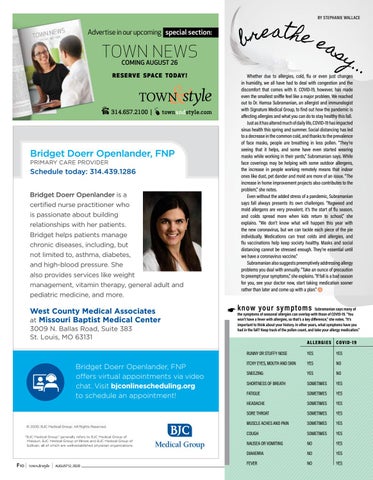BY STEPHANIE WALLACE
Advertise in our upcoming special section:
TOWN NEWS COMING AUGUST 26
R E S E RV E S PAC E TO DAY !
314.657.2100 |
m townandstyle.com
Bridget Doerr Openlander, FNP PRIMARY CARE PROVIDER
Schedule today: 314.439.1286 Bridget Doerr Openlander is a certified nurse practitioner who is passionate about building relationships with her patients. Bridget helps patients manage chronic diseases, including, but not limited to, asthma, diabetes, and high-blood pressure. She also provides services like weight management, vitamin therapy, general adult and pediatric medicine, and more.
West County Medical Associates at Missouri Baptist Medical Center 3009 N. Ballas Road, Suite 383 St. Louis, MO 63131
Bridget Doerr Openlander, FNP offers virtual appointments via video chat. Visit bjconlinescheduling.org to schedule an appointment!
© 2020. BJC Medical Group. All Rights Reserved. “BJC Medical Group” generally refers to BJC Medical Group of Missouri, BJC Medical Group of Illinois and BJC Medical Group of Sullivan, all of which are well-established physician organizations.
F10 |
TOWN&style
|
AUGUST 12, 2020
at h e e r b ea sy ...
Whether due to allergies, cold, flu or even just changes in humidity, we all have had to deal with congestion and the discomfort that comes with it. COVID-19, however, has made even the smallest sniffle feel like a major problem. We reached out to Dr. Hamsa Subramanian, an allergist and immunologist with Signature Medical Group, to find out how the pandemic is affecting allergies and what you can do to stay healthy this fall. Just as it has altered much of daily life, COVID-19 has impacted sinus health this spring and summer. Social distancing has led to a decrease in the common cold, and thanks to the prevalence of face masks, people are breathing in less pollen. “They’re seeing that it helps, and some have even started wearing masks while working in their yards,” Subramanian says. While face coverings may be helping with some outdoor allergens, the increase in people working remotely means that indoor ones like dust, pet dander and mold are more of an issue. “The increase in home improvement projects also contributes to the problem,” she notes. Even without the added stress of a pandemic, Subramanian says fall always presents its own challenges. “Ragweed and mold allergens are very prevalent, it’s the start of flu season, and colds spread more when kids return to school,” she explains. “We don’t know what will happen this year with the new coronavirus, but we can tackle each piece of the pie individually. Medications can treat colds and allergies, and flu vaccinations help keep society healthy. Masks and social distancing cannot be stressed enough. They’re essential until we have a coronavirus vaccine.” Subramanian also suggests preemptively addressing allergy problems you deal with annually. “Take an ounce of precaution to preempt your symptoms,” she explains. “If fall is a bad season for you, see your doctor now, start taking medication sooner rather than later and come up with a plan.” &
your symptoms Subramanian says many of ☛ know the symptoms of seasonal allergies can overlap with those of COVID-19. “You
won’t have a fever with allergies, so that’s a key difference,” she notes. “It’s important to think about your history. In other years, what symptoms have you had in the fall? Keep track of the pollen count, and take your allergy medication.”
ALLERGI E S C OVI D -19
RUNNY OR STUFFY NOSE
YES
YES
ITCHY EYES, MOUTH AND SKIN
YES
NO
SNEEZING
YES
NO
SHORTNESS OF BREATH
SOMETIMES
YES
FATIGUE
SOMETIMES
YES
HEADACHE
SOMETIMES YES
SORE THROAT
SOMETIMES
YES
MUSCLE ACHES AND PAIN
SOMETIMES
YES
COUGH
SOMETIMES YES
NAUSEA OR VOMITING
NO
YES
DIAHERRA
NO
YES
FEVER
NO YES
